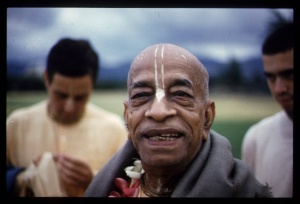CC Madhya 11.55: Difference between revisions
No edit summary |
(Vanibot #0054 edit - transform synonyms into clickable links, which search similar occurrences) |
||
| Line 17: | Line 17: | ||
<div class="synonyms"> | <div class="synonyms"> | ||
''prema- | ''[//vanipedia.org/wiki/Special:VaniSearch?s=prema&tab=syno_o&ds=1 prema]-[//vanipedia.org/wiki/Special:VaniSearch?s=āveśe&tab=syno_o&ds=1 āveśe]'' — ''in ecstatic love; ''[//vanipedia.org/wiki/Special:VaniSearch?s=puṣpa&tab=syno_o&ds=1 puṣpa]-[//vanipedia.org/wiki/Special:VaniSearch?s=udyāne&tab=syno_o&ds=1 udyāne]'' — into the garden at Guṇḍicā where the Lord stays; ''[//vanipedia.org/wiki/Special:VaniSearch?s=karibena&tab=syno_o&ds=1 karibena] [//vanipedia.org/wiki/Special:VaniSearch?s=praveśa&tab=syno_o&ds=1 praveśa]'' — ''will enter; ''[//vanipedia.org/wiki/Special:VaniSearch?s=sei&tab=syno_o&ds=1 sei]-[//vanipedia.org/wiki/Special:VaniSearch?s=kāle&tab=syno_o&ds=1 kāle]'' — at that time; ''[//vanipedia.org/wiki/Special:VaniSearch?s=ekale&tab=syno_o&ds=1 ekale]'' — alone; ''[//vanipedia.org/wiki/Special:VaniSearch?s=tumi&tab=syno_o&ds=1 tumi]'' — you; ''[//vanipedia.org/wiki/Special:VaniSearch?s=chāḍi’&tab=syno_o&ds=1 chāḍi’]'' — giving up; ''[//vanipedia.org/wiki/Special:VaniSearch?s=rāja&tab=syno_o&ds=1 rāja]-[//vanipedia.org/wiki/Special:VaniSearch?s=veśa&tab=syno_o&ds=1 veśa]'' — the royal dress. | ||
</div> | </div> | ||
Latest revision as of 21:28, 19 February 2024
Śrī Caitanya-caritāmṛta - Madhya-līlā - Chapter 11: The Beḍā-kīrtana Pastimes of Śrī Caitanya Mahāprabhu

His Divine Grace
A.C. Bhaktivedanta Swami Prabhupada
A.C. Bhaktivedanta Swami Prabhupada
TEXT 55
- premāveśe puṣpodyāne karibena praveśa
- sei-kāle ekale tumi chāḍi’ rāja-veśa
SYNONYMS
prema-āveśe — in ecstatic love; puṣpa-udyāne — into the garden at Guṇḍicā where the Lord stays; karibena praveśa — will enter; sei-kāle — at that time; ekale — alone; tumi — you; chāḍi’ — giving up; rāja-veśa — the royal dress.
TRANSLATION
“On that Ratha-yātrā festival day, after dancing before the Lord, Śrī Caitanya Mahāprabhu will enter the Guṇḍicā garden. At that time you should go there alone, without your royal dress.